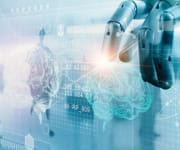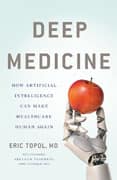Life Extension Magazine®
The healthcare system is in crisis. Doctors are overworked and burned out, and the lack of time for individualized attention with patients has led to record numbers of misdiagnoses and medical errors.
In his latest book, Deep Medicine: How Artificial Intelligence Can Make Healthcare Human Again, Dr. Eric Topol, world-renowned cardiologist and executive vice president of Scripps Research, discusses a surprising solution: artificial intelligence (AI).
While integrating computers into the healthcare system might initially seem less human, Topol explains that the true benefit of AI is its potential to help free doctors from tasks that interfere with human connection. According to Topol, technology like virtual assistants, smart speakers, and smartphone apps will liberate doctors from keyboards, freeing them to spend the time necessary to restore trust between doctor and patient.
In addition, Topol discusses how AI can help improve aspects of the healthcare system ranging from diagnosing cancer, to helping predict and prevent suicide, to helping seniors live independently. Along the way, he is open about the potential pitfalls of the technology (including privacy and ethics), noting where AI has fallen short and envisioning how it could improve in the future.
In this Q&A with Life Extension®, adapted from Deep Medicine, Dr. Topol explains in more detail the exciting technological advances that are ushering in a new, improved age of medicine and healthcare.
—Laurie Mathena
LE: Artificial intelligence (AI) seems like science fiction, but it is very much a reality today.

Dr. Topol: AI has been sneaking into our lives. It is already pervasive in our daily experiences, ranging from autocomplete when we type, to unsolicited recommendations on Google searches, to music suggestions based on our listening history, to Alexa answering questions or turning out the lights.
Conceptually, its roots date back more than 80 years, and its name was coined in the 1950s, but only recently has its potential impact in healthcare garnered notice. The promise of artificial intelligence in medicine is to provide composite, panoramic views of individuals’ medical data; to improve decision making; to avoid errors such as misdiagnosis and unnecessary procedures; to help in ordering and interpretation of appropriate tests; and to recommend treatment. Underlying all of this are data.
While the data keep pouring out, we’ve processed only a tiny fraction. Most estimates are less than 5%, if that much. In a sense, it was all dressed up with nowhere to go—until now. Advances in artificial intelligence are taming the unbridled amalgamation of Big Data by putting it to work.
LE: In your book, you discuss deep learning, which teaches computers to do what comes naturally to humans. Can you give an overview of what deep learning can accomplish?
Dr. Topol: In the past few years, several studies relying on deep learning have been published in leading peer-reviewed medical journals.
Many in the medical community were frankly surprised by what deep learning could accomplish: studies that claim AI’s ability to diagnose some types of skin cancer as well as or perhaps even better than board-certified dermatologists; to identify specific heart-rhythm abnormalities like cardiologists; to interpret medical scans or pathology slides as well as senior, highly qualified radiologists and pathologists, respectively; to diagnose various eye diseases as well as ophthalmologists; and to predict suicide better than mental health professionals.
These skills predominantly involve pattern recognition, with machines learning those patterns after training on hundreds of thousands, and soon enough millions, of examples. Such systems have just gotten better and better, with the error rates for learning from text-, speech-, and image-based data dropping well below 5%, whizzing past the human threshold.
LE: Let’s talk in more detail about a few specific examples. How could AI transform the field of, say, radiology?
Dr. Topol: A radiologist reads about 20,000 studies a year, which equates to somewhere between 50-100 per day, a number that has been steadily increasing. While X-rays are single-digit images per exam, ultrasounds are dozens, and CT scans and MRIs are hundreds, a ratio that keeps increasing. All told there are more than 800 million medical scans a year in the United States, which amounts to about 60 billion images, or one image generated every two seconds.
Some studies suggest that errors in interpretation of medical scans are far worse than generally accepted, with false positive rates of 2% and false negative rates over 25%. Given those 800 million annual scans, that means large numbers of readings are at risk of being wrong.
Radiologists, then, would certainly benefit from a machine accuracy booster. For example, a careful study of classifying more than 50,000 chest X-rays as simply either normal or abnormal achieved algorithmic accuracy of 95%, which could prove useful for radiologists to triage which ones merit a closer look.

LE: How can AI help with something like a cancer diagnosis?
Dr. Topol: There is one last place so far where cancer could prove amenable to attack by AI: gastroenterology. The accurate diagnosis of colon polyps and cancer lesions during colonoscopy is more difficult than most people are aware. Multiple studies have shown that these lesions are missed in at least 20% of patients, with some reports considerably higher.
Recently, the idea of using AI to detect these lesions was advanced in a deep-learning study that used 300 features from 30,000 colonoscopy images, magnified 500-fold, and then tested the algorithm in 250 patients with 306 polyps. The 86% accuracy achieved is promising compared with the literature.
In the first prospective study of colonoscopy with real time AI-processed imaging, the results from 325 patients were very encouraging for accurate diagnosis of tiny (as they are called “diminutive”) polyps. The use of such high magnification and machine pattern review suggests it may ultimately be a very useful adjunct for this important screening procedure.
LE: AI clearly has the potential to help with diagnoses, but can it do anything to help seniors maintain their independence?
Dr. Topol: Apart from elderly patients with an acute illness, there is a concentrated effort to use AI to support seniors’ ability to live and thrive in their home, rather than having to move into assisted living facilities or even needing to have caregivers make frequent visits.
There’s an extraordinary array of start-ups developing sensors and algorithms that monitor gait, pulse, temperature, mood, cognition, physical activity, and more. Moreover, AI tools to improve vision and hearing can even augment seniors’ sensory perception, which would promote their safety and improve their quality of life.
For example, with the Aipoly app, a senior with significant visual impairment can simply point to an object with a smartphone, and AI will quickly kick in with a voice response identification. It does the same for identifying colors.
Sensors that can detect whether someone has fallen can be embedded in the floor. And robot assistants in the form of pets as well as specially designed Alexa-like voice assistants like ElliQ are examples of hardware AI to promote independent living.
LE: Does AI have the capability of helping someone develop a personalized nutrition plan?
Dr. Topol: AI can also revolutionize other aspects of our lives that are, in one sense or another, upstream from the clinic. A huge one is how we eat. One of the unexpected and practical accomplishments of machine learning to date has been to provide a potential scientific basis for individualized diets. That’s conceivably an exciting advance—the idea of knowing what specific foods are best for any given person.
We can now predict in healthy people, without diabetes, what particular foods will spike their blood sugar. Such advances far outstrip whatever benefits might accrue from following a diet for all people, such as the classic food pyramids, or fad diets like Atkins or South Beach, none of which ever had a solid evidence basis.
Many of these at-home advances will come together in the virtual medical coach. It most likely will be voice mediated, like Siri, Alexa, and Google Home, but unlikely to remain a cylinder or a squiggle on a screen. I suspect they’re more apt to come in the form of a virtual human avatar or hologram (but simply text or e-mail if one prefers).
The virtual medical coach is the deep learning of all of one’s data, seamlessly collected, continuously updated, integrated with all biomedical knowledge, and providing feedback and coaching. Such systems will initially be condition-specific, say for diabetes or high blood pressure, but eventually they’ll offer a broad consumer health platform to help prevent or better manage diseases.
LE: One of the ironies of AI is that you claim this technology will make healthcare human again.
Dr. Topol: Along with the explosive economic growth of healthcare, the practice of medicine has been progressively dehumanized. Rather than all the talk of “personalized” medicine, business interests have overtaken medical care. Clinicians are squeezed for maximal productivity and profits. We spend less and less time with patients, and that time is compromised without human-to-human bonding.
The medical profession has long been mired in inefficiency, errors, waste, and suboptimal outcomes. In recent decades, it has lost its way from taking true care of patients. A new patient appointment averages 12 minutes, a return visit, seven.
One of the most important potential outgrowths of AI in medicine is the gift of time. Time is essential to the quality of care patients receive and to their health outcomes.
AI can help achieve the gift of time with patients. One of the most important effects will come from unshackling clinicians from electronic health records. At the University of Colorado, taking the computer out of the exam room and supporting doctors with human medical assistants led to a striking reduction in physical burnout, from 53% to 13%.
We need everyone on board, not just leaders. If the heightened efficiency is just used by administrators as a means to rev up productivity, so doctors see more patients, read more scans or slides, and maximize throughput, there will be no gift of time.
LE: Can you give a few specific examples of how AI could help free up time for doctors and nurses?
Dr. Topol: How AI can ease medical workflow is exemplified by a program that MedStar Health, the largest health system in the Washington, DC, region, has initiated in its emergency rooms. The typical ER patient has about 60 documents in his or her medical history, which takes considerable time for clinicians to review and ingest.
MedStar developed a machine-learning system that rapidly scans the complete patient record and provides recommendations regarding the patient’s presenting symptoms, freeing doctors and nurses to render care for their patients.

Another example is AI automation of medical images, which isn’t simply about reading MRIs. The FDA-approved Arterys algorithm called Deep Ventricle enables rapid analysis of the heart’s blood flow, reducing a task that can take an hour as blood is drawn and measured by hand, to a 15-second scan.
LE: The potential of AI to improve so many aspects of healthcare is very exciting.
Dr. Topol: We’re still in the earliest days of AI in medicine. The field is long on computer algorithmic validation and promises but very short on real-world, clinical proof of effectiveness.
But with the pace we’ve seen in just the past few years, with machines outperforming humans on specific, narrow tasks and likely to accelerate and broaden, it is inevitable that narrow AI will take hold.
Adapted from Deep Medicine: How Artificial Intelligence Can Make Healthcare Human Again, by Eric Topol. Copyright © 2019 by Eric Topol. Available from Basic Books, an imprint of Perseus Books, a division of PBG Publishing, LLC, a subsidiary of Hachette Book Group, Inc.
Eric Topol is a world-renowned cardiologist, executive vice president of Scripps Research, founder of a new medical school, and one of the top 10 most-cited medical researchers.
To order a copy of Deep Medicine, call 1-800-544-4440.
If you have any questions on the scientific content of this article, please call a Life Extension® Wellness Specialist at 1-866-864-3027.

